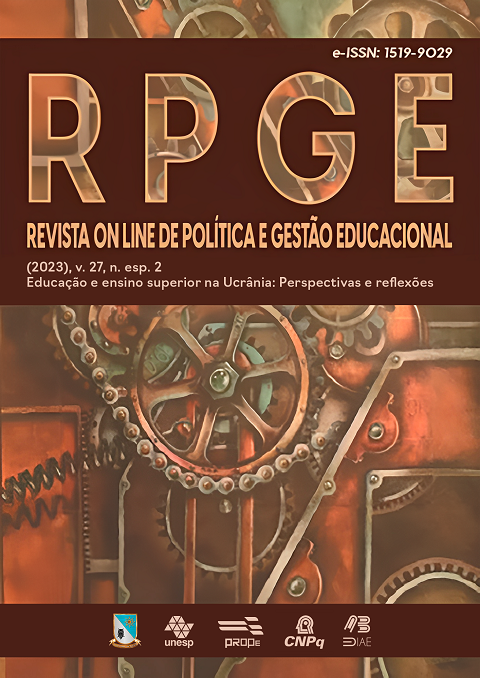Ensino superior militar na Ucrânia
Princípios teóricos e metodológicos, condições psicológicas e pedagógicas para o desenvolvimento de qualidades de liderança
DOI:
https://doi.org/10.22633/rpge.v27iesp.2.18584Palavras-chave:
Educação moderna, Educação militar, Liderança, Didática digital, Preparação profissionalResumo
Este estudo consistiu na análise das particularidades envolvidas no desenvolvimento das aptidões de liderança em indivíduos em formação para se tornarem soldados durante o processo de treinamento. A tarefa em questão pode ser divisada condicionalmente em duas fases distintas: a primeira, que envolve a exploração dos fundamentos teóricos e metodológicos subjacentes ao desenvolvimento das mencionadas aptidões de liderança; e a segunda, que se concentra na busca por um modelo eficiente para o aprimoramento dessas capacidades. A base metodológica da pesquisa foi composta por métodos científicos e pedagógicos. Foi constatado que os estudantes das Instituições de Ensino Superior Militar devem engajar-se no estudo de matérias relacionadas à teoria militar, táticas, estratégia, organização e gestão de unidades militares, equipamento militar, bem como aspectos jurídicos militares, entre outros conteúdos.
Downloads
Referências
ANGGRAINI, R.; HANDAYANI, Y. Digitalization in education. Journal of Digital Education, Communication, and Arts (Deca), [S. l.], v. 5, n. 01, p. 1-12, 2022. DOI: 10.30871/deca.v5i01.2942.
ANISHCHENKO, V. et al. Full-scale military invasion of the Russian Federation of Ukraine as a factor of social transformations in higher education. Revista Amazonia Investiga, [S. l.], v. 12, n. 61, p. 287-296, 28 Feb. 2023. DOI: 10.34069/+ai/2023.61.01.29.
BADER , S.; OLEKSIIENKO , A.; MERENIUK , K. Digitalization of future education: analysis of risks on the way and selection of mechanisms to overcome barriers (Ukrainian experience). Futurity Education, [S. l.], v. 2, n. 2, p. 21–33, 2022. DOI: 10.57125/FED/2022.10.11.26. Disponível em: https://futurity-education.com/index.php/fed/article/view/54. Acesso em: 18 maio 2023.
BUKLIV , R.; KUCHAK, A.; VASYLYUK-ZAITSEVA , S. Professional training of future academic staff and digitalization of education: analysis of mutual influences. Futurity Education, [S. l.], v. 3, n. 1, p. 69–78, 2023. DOI: 10.57125/FED.2023.25.03.06.
FERNÁNDEZ-CERERO, J.; MONTENEGRO-RUEDA, M.; FERNÁNDEZ-BATANERO, J. M. Impact of University Teachers’ Technological Training on Educational Inclusion and Quality of Life of Students with Disabilities: A Systematic Review. International Journal of Environmental Research and Public Health, [S. l.], v. 20, n. 3, p. 2576, 2023. DOI: 10.3390/ijerph20032576.
KONOKH, O. et al. Features of training cadets in physical education in military institutions of higher education. Systematic Reviews in Pharmacy, [S. l.], v. 11, n. 10, p. 278–281, 2020. DOI: 10.31838/srp.2020.10.46.
KORYLCHUK, N. et al. Theoretical and methodological principles of providing medical and psychological assistance in the conditions of armed conflicts: experience for Ukraine. Revista Amazonia Investiga, [S. l.], v. 11, n. 60, p. 135-144, 30 Dec. 2022. DOI: 10.34069/ai/2022.60.12.14.
MA, X. et al. Necessity of Post-War Renewal of University Teachers’ Potential in Terms of Sustainable Development in Ukraine. Sustainability, [S. l.], v. 14, n. 19, p. 12598, 3 Oct. 2022. DOI: 10.3390/su141912598.
NECHYPORUK, Nataliia. Formation of intercultural competence as a pedagogical problem. ScienceRise: Pedagogical Education, [S. l.], v. 4 ,n. 43, p. 36-41, 30 July 2021. DOI: 10.15587/2519-4984.2021.238018.
NEVZOROV, Roman. Quality management of ground training of future pilots in the conditions of modern educational space in ukraine. Economics & Education, [S. l.], v. 6, n. 2, p. 90-94, 27 Aug. 2021. DOI: 10.30525/2500-946x/2021-2-16.
RIDEI, N. Analysis of professional competencies in the characteristics of the teacher of the future: global challenges of our time . Futurity Education, [S. l.], v. 1, n. 1, p. 22–32, 2021. DOI: 10.57125/FED.2022.10.21.3.
SHEVCHENKO, V. V. The reform of the higher education of Ukraine in the conditions of the military-political crisis. International Journal of Educational Development, [S. l.], v. 65, p. 237-253, Mar. 2019. DOI: 10.1016/j.ijedudev.2018.08.009.
SMIRNOV, S. Analysis of professional training of future reserve officers in the system of modern military education. Science and Education a New Dimension, [S. l.], v. VII(199), n. 33, p. 49-52, 25 June 2019. DOI: 10.31174/send-hs2019-199vii33-12.
SYDORENKO, V. Soft skills as an educational trend and a necessary development component for a vocational lifelong education teacher. Fundamental and applied researches in practice of leading scientific schools, [S. l.], v. 38, n. 2, p. 127-134, 2020. Disponível em: https://scholar.google.com/citations?view_op=view_citation&hl=th&user=rezcNT4AAAAJ&citation_for_view=rezcNT4AAAAJ:BwyfMAYsbu0C. Acesso em: 10 jan. 2023.
TSEKHMISTER, Y. The problem of pedagogical innovations and trends in the development of the educational environment. Futurity Education, [S. l.], v. 1, n. 2, p. 22–30, 2021. DOI: 10.57125/FED/2022.10.11.16. Disponível em: https://futurity-education.com/index.pnp/fed/article/view/40. Acesso em: 18 maio 2023.
TYTOVA, N.; MERENIUK, K. Digital literacy of future teachers in the realities of large-scale military aggression (Ukrainian experience). Futurity Education, [S. l.], v. 2, n. 3, p. 43–54, 2022. DOI: 10.57125/FED/2022.10.11.33. Disponível em: https://futurity-education.com/index.php/fed/article/view/50. Acesso em: 18 maio 2023.
VASISHHEV, V. et al. Experimental study of the formation of general pedagogical culture of future officers in the process of professional training. Journal of positive school psychology, [S. l.], v. 6, n. 6, p. 4197–4205. 2022. Disponível em: https://www.journalppw.com/index.php/jpsp/article/view/8143. Acesso em: 18 maio 2023.
Publicado
Como Citar
Edição
Seção
Licença
Copyright (c) 2023 Revista on line de Política e Gestão Educacional

Este trabalho está licenciado sob uma licença Creative Commons Attribution-NonCommercial-ShareAlike 4.0 International License.
Manuscritos aceitos e publicados são de propriedade da Revista on line de Política e Gestão Educacional. É vedada a submissão integral ou parcial do manuscrito a qualquer outro periódico. A responsabilidade do conteúdo dos artigos é exclusiva dos autores. É vedada a tradução para outro idioma sem a autorização escrita do Editor ouvida a Comissão Editorial Científica.











